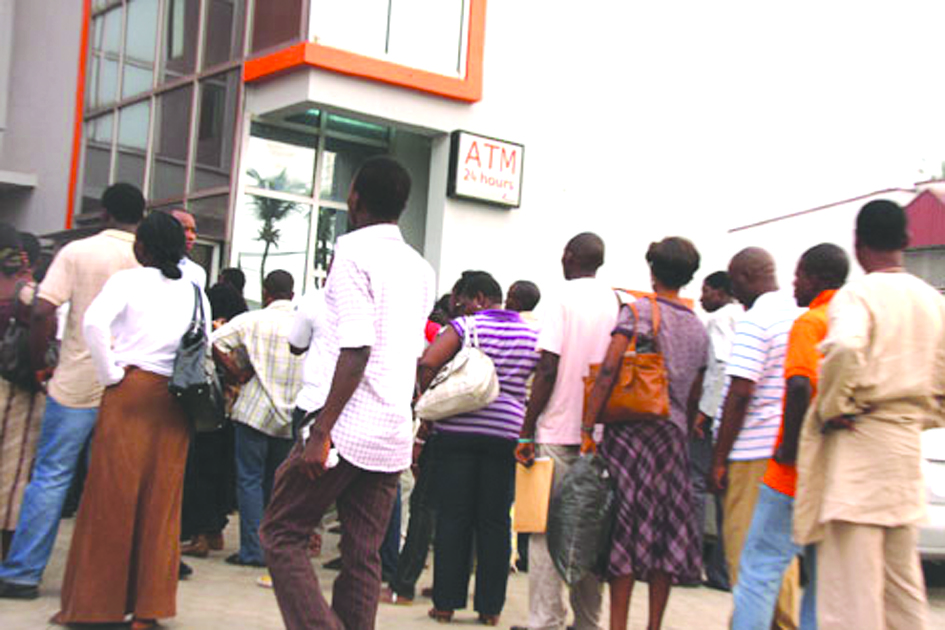[tweet][digg][stumble][Google][pinterest][follow id=”DER29709692″ size=”large” count=”true” ]
Poor internet connectivity associated with the wet season is impacting negatively on the Central Bank’s cashless policy as customers of many commercial banks are finding it difficult to use the Automated Teller Machine (ATM) and Point of Sales (PoS) machines for transactions
By Osaze Omoragbon
Poor internet connectivity usually associated with the wet season is taking its toll on banking services, leaving the customers frustrated. Many of them have continued to decry poor banking services which they say have negatively impacted their businesses. From Lagos to Bauchi, the story is the same as most banks’ officials who spoke to TheEconomy blamed the poor connectivity on the rainy season. A year after TheEconomy first reported on the matter, it is yet to improve just as banks are making efforts to remedy the situation. A visit to some banking halls reveals the frustration of customers who all denounced the inability of the banks to fix their networks. “I am tired of this bank,” said Malik Tejuosho, a customer of one of the old generation banks. He decried the impact of the poor banking services on his tailoring business saying “despite the excessive charges, banks cannot upgrade their systems to function effectively”.
The poor connectivity has also taken its toll on the Automated Teller Machine (ATM) services which most customers rely on for minor transactions. ATM services, according to most banks, are meant for transactions of or below N100,000. However, customers who often patronize the ATM have sour stories to tell. “I don’t know how long we will be stranded at the ATMs. Since the rainy season started we have been experiencing network problems,” said Josephine Bajowa, a boutique owner.
For the Point of Sales (PoS) machines, the story is the same as most businesses that utilize PoS continue to incur loss due to poor connectivity. Frank Eshalomi, a bookshop operator in Surulere, Lagos said poor connectivity has cost his business lots of money as most customers who prefer paying for goods purchased through their debit cards are not able to do so, leaving both parties frustrated. “I think something should be done about this connectivity problem before it does serious damage to the cashless policy. We are losing money anytime there is poor connectivity,” he fumed. A sales representative with Shoprite who prefers anonymity said “we lose sales due to the problem of connectivity.”
Blame game
Though most banks have attributed the challenge to the wet season, a cash officer with First Bank who declined to be named traced the connectivity problem the bank faces to the recent upgrade of its systems. While absolving First Bank of any blame, he noted that the challenge has impacted on service delivery in the industry as other banks also face connectivity problem. A management staff of Zenith Bank Plc who pleaded for anonymity attributed the bad connectivity to poor signals of telecom companies which banks receive through their VSAT networks. He, however, said the signals of telecom companies using fiber optic cables are better because they are buried in the ground compared to those who rely on masts. “You know these are radio signals and the rain often disturb the troposphere; where radio signals are propagated,” he said.
Experts are of the view that the cashless policy of the Central Bank of Nigeria (CBN) which was recently extended to more cities across the country is hinged on adequate internet and connectivity infrastructure. Sanusi Lamido Sanusi, the former CBN governor, had attributed the initial hiccups encountered by the cashless policy to low network bandwidth, data surge and inadequate network coverage. “Sometimes we have a lot of data failure due to low bandwidth. The telecom companies have to increase the bandwidth so that they can take more data easily,” he said. While attributing the challenge of switching network (due to lack of network) to the prohibitive cost which will be passed on to customers, he explained that the apex bank was trying to find a solution that will not be too expensive to the customer.
Most bank customers who patronize the ATMs were relieved when the CBN in conjunction with the Bankers’ Committee abolished the N100 ATM transaction fee. Mr. Adeyinka Adedeji, head UBA e-banking Division, noted that electronic transactions have jumped significantly since the N100 ATM charge was scrapped. He linked the connectivity problem of PoS to the telecom companies, saying “the connectivity of ATM uses internet but that of PoS is through the General Packet Radio Services (GPRS). The telcom companies have not given much priority to that, and just like several others we face the same problem,” he said.
Though most banks have invested billions of Naira in upgrading their IT infrastructure to meet with today’s banking services, the connectivity challenge persists. However, observers are of the view that the challenge could undermine banks’ efforts if something is not done urgently. The global ICT revolution has ensured that banking services now rely heavily on IT and only banks with strong IT infrastructure will reap the benefits of modern banking. “Electronic banking is as strong as its IT department,” UBA’s Adeyinka stated.
[divider]


